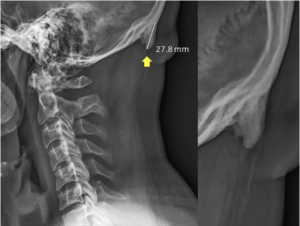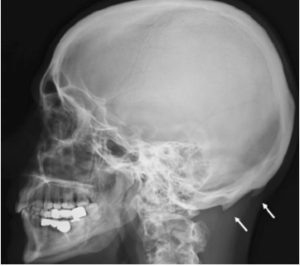
- “No swimming until an hour after eating”.
- “You’ll go blind if you sit too close to the TV”.
- “Sugar makes kids hyper”.
These are examples of myths we’ve all been told by our parents. These can be best classified as, “Because I said so”, tales. There is no scientific consensus backing any of these statements.
Published last week in the Washington Post was a similar nonsensical article about occipital horns.
“New research in biomechanics suggests that young people are developing hornlike spikes at the back of their skulls…” The Washington Post references an “academic paper” linking these bone growths to overuse of smartphones and handheld devices. Repeatedly looking down and flexing the neck somehow instigates this bone growth… a “skeletal adaption to the penetration of advanced technology”.
This particular “research” was not conducted in reputable academic manner. This is what we call, “anecdotal evidence”, at best. Most journals would avoid publishing something like this.
On the contrary, there is a scientifically proven condition, called Menkes disease, or “Occipital Horn Syndrome”. This is an inheritable genetic disorder of copper metabolism, with a known mutation in the ATP7A gene. This disorder has been recognized since the 1960’s… long before the advent of handheld devices or our predilection to stare at them.

Menkes Disease
There is absolutely no verifiable risk associated with looking down at your smartphone and developing an occipital bone protrusion. In fact, researchers have attempted to argue for years the pitfalls of Internet reading or smartphone use, even though the classical way of reading print also tends to involve flexing the neck. And in the historical context, a few hundred years ago, print novels similarly were accused of causing various psychological medical conditions.
It is important to always be discerning while reading medical information from newsfeeds.
Shahar D et al. Prominent exostosis projecting from the occipital squama more substantial and prevalent in young adult than older age groups. Scientific reports. 8:3354, 2018
Menkes JH et al. A sex-linked recessive disorder with retardation of growth, peculiar hair and focal cerebral and cerebellar degeneration. Pediatrics 29, 764-779, 1962
Yasmeen S. Occipital horn syndrome and classical Menkes Syndrome caused by deep intronic mutations, leading to the activation of ATP7A pseudo-exon. European Journal of Human Genetics. 22, 517-521, 2014






